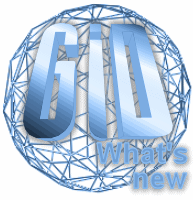The meshing parameters used and the GiD version are stored with the model. It is possible to list them with the Status command.
Customization tcl variable GidPriv(TextOfVersion) in the ConfigureProgram.tcl file to show in the help (for example, to show the version of a problem type, not the GiD version)
New tcl Order: ".central.s info GiDVersion" (returns the internal GiD version number)
New tcl Order: info list_entities -more elements "selection" (-more also returns the element number, number of nodes and the volume)
Use of enhanced memory to write the calculation file
Draw of conditions over layer (the layer entities are drawn)
New GiD-tcl events send to problemtype.tcl (proc EndGIDPostProcess {} and proc LoadResultsGIDPostProcess {file})
New *.bas command *LocalAxesDefCenter (returns the center of the user defined local axis, similar to LocalAxesDef)
Inline tutorials (see Help->Tutorials)
Conditions Window: Entities->AllConditions (lists all conditions of the model)
New *.bas commands *time and *clock to measure the time used to write the calculation file (useful for debug purposes)
The right buttons (hidden by default) now open the new conditions, materials, etc windows.
Mesh extrusion enabled in the Copy window
Split surface (menu Geometry->Edit->Divide->Surfaces->Split): used to divide a surface selecting the divide lines (these lines have to intersect the surface contours)
New *.bas commands related to layers: (*Set Layer LayerName *nodes|elems, *Loop nodes|elems *OnlyInLayer, *NodesLayerNum *NodesLayerName *ElemsLayerNum *ElemsLayerName)
Layer window updated
Mesh only nodes (create elements with one single node)
New import filter: ACIS V5.0 (files with ".sat" extension)
Window to edit Nurbs lines and surfaces in "free-form" mode
Option TangentNurbsL, to force two adjacent Nurbs lines to be tangents
Boolean operations (union, intersection, subtraction) in "Solids 2D" (surfaces in same plane)
Variable 'MaintainOldMesh', depending on its value the old mesh is not deleted when creating a new mesh (used to mesh separate objects by parts)
Preference option to force the meshing of entities even if its higher entities are meshed.
Nastran read enhanced
Background mesh file, to assign mesh sizes (adaptive remesh)
Layer commands in the .bas file (commands: *Loop Layer, *LayerName *LayerNum)
New HTML help
Utility to draw dimensions (vertex, distance, center, angle, text)
Selection point: option center (arc or Nurbs with arc shape)
Draw boundary mesh: interface of material is considered boundary
Layers: classify in Front or Back (hide) containers
Multiple surface intersection
Division of a Nurbs surface selecting the lines to break
Selecting entities: new options AddToSelection, RemoveFromSel or SwapSelection
New selection filter window
New filter selection by element type (e.g. filter:ElementType=TRIANGLE)
Creation of a Boundary Mesh from a higher mesh (e.g. triangles from a volume mesh)
RJump mesher: experimental option to create elements jumping between tangent contiguous surfaces
Nurbs surface creation from a cloud of points or level curves (topographic applications)
Now Conditions can be applied over layers
HTML support to include help in your problem types
New TCL functions to customize menus
New command of the batch file. *****TCL "tcl command", to execute a tcl command in a batch file.
New options available ("Element size" and "Minimum Edge") in the MeshQuality window.
In the MeshQuality window, if you double click on a value, the elements below/over this value are selected.
Option DrawSizes of the Meshing menu. Different assigned sizes in a mesh are represented in different colors.
Optimization of the Edit Nurbs Line/Surface tool.
Option SendLayToUse in the contextual menu sends the selection to the Layer in use.
Option Smoothing in the mesh preferences.
Option DrawHiger in the Utilities menu, it draws higher entities in different colors.
New command of the .bas file, *ElemsNnode. This command returns the number of nodes of the actual element. (Useful in loops of elements)
Option Collapse Edges. It has to be applied over a mesh, and it joins nodes that are connected by edges shorter than the Import Tolerance value.
Now it's possible to invoke GiD with option -n2. That option runs the program without any window but the Tk library is loaded.
New Tcl function available, GiDVersionCmp, useful to check the version of the GiD which is currently running.
New command of the .bas file, pow(a,b).
'Color Window' in contour options added.
Legends, comments and axes can be moved around the screen.
Enhanced Gauss Points support
JPEG and MJPG support.
TecPlot ASCII postprocess files supported.
Femap neutral postprocess files supported.
New Results file format: more understandable.
New results visualization types: contour ranges with text labels.
Several improvements:
More accurate smooth render
More accurate cut elements generation
Better management of holes in result values
High resolution printing
Better gauss points management: contour values that cannot be extrapolated to the nodes, are drawn as coloured balls
Points support, with variable radius and textures.
Color improvements for vectors, stream lines, contours, sets, ...
Separation of sets corresponding to materials or layers in preprocess.
Names on Volume, Surface and Cut sets.
Transparent and massive properties independent for each set.
Added List status of sets, nodes and elements (entities) with results.
New sets and Results can be merged into the current ones.
New output possibilities: VRML, animated GIFs, PNG, AVI, pictures of multiple windows.
Automatic results comments.
GiD - The personal pre and post processor
General
Content
Integrations
